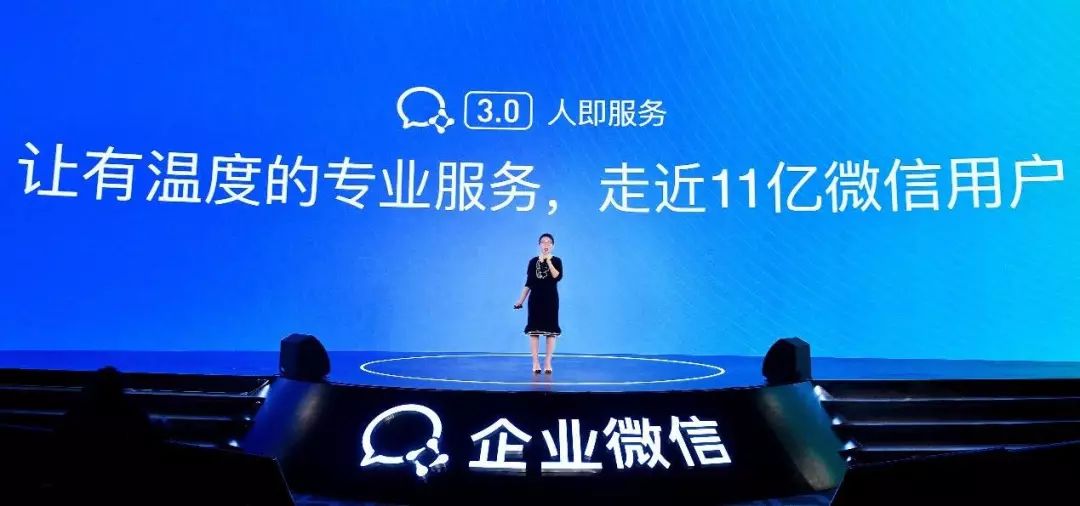When we talk about corporate WeChat, we are not talking about WeChat’s 1.1 billion traffic, not about friends or WeChat groups, nor about private domain traffic. We may be talking about real customer value.
Editor’s note: This article comes from WeChat public account “ Yan Tao Sanshou ” (ID : Yantao-219), author Yan Tao.
Often the depth and breadth of a person’s perception of a thing determines what he can ultimately achieve. The launch of Enterprise WeChat 3.0 has received much more attention than its launch, which must have its reasons.
Today ’s article will give you an in-depth analysis of the WeChat value of enterprises that may be underestimated and the WeChat operations of enterprises that may be overlooked.
It’s a bit long, so please be patient and read it, it will be a great deal!
The release of enterprise WeChat 3.0 has become a hot spot in the Internet and retail industries for a while. Who makes it a close brother to WeChat, which has 1.1 billion traffic. Today’s corporate growth is facing slowdown or stagnation, so corporate WeChat has become a “life-saving straw” in the cold winter of traffic.
After watching the conference, I was both happy and a little worried. Tencent has made it clear that whether it is 2B, 2G, or 2C, WeChat has a natural advantage.
The company WeChat shouted more directly this time: Help the company “connect employees and connect users” to realize the digital survival of the company. The release of this ability, from a ramen restaurant to a retail giant like Wal-Mart, will be profoundly affected.

So when looking at corporate WeChat, we can’t just use it as an office collaboration tool or formal “private domain traffic”. We should look at its current value from the current business environment, future development needs, and sustainable growth of the enterprise.
I believe that the depth and breadth of a person’s perception of a thing often determines what he can achieve.
As a veteran of social marketing for 10 years, I have experienced the evolution of new things from Kaixin.com to Douyin, and as a practitioner of private domain traffic research, today I will talk about my views on corporate WeChat. Let’s talk about its value first.
Enterprise WeChat will greatly accelerate the digital transformation of enterprises and upgrade competition
Every commercial competition is ultimately an efficient competition, The more digital the more efficient it will be. In the past, when talking about customer digitization, all were things that big brands could do, such as building an official website, advertising, purchasing a CRM system, etc., which were costly and required a professional team.
If Taobao and Meituan help businesses to digitize their products, WeChat helps small and micro individuals to large and medium-sized enterprises to realize customer digitization at a very low cost. It’s ferocious and quicker than ever.
You see, whether it’s a small street shop or a chain of brand stores, their employees are using WeChat to communicate with consumers.
I have a convenience store downstairs. The boss asked me to add his WeChat two years ago. When should I send water, just leave a message on WeChat and transfer money. During the New Year, he can still receive his greetings, and occasionally he has the care of a small red envelope. In the past two years, I ordered water at their home, bought some daily necessities, and then he also established a community WeChat group.
In this way, he obtained the customer address, information, whether he was even married, whether he had a baby, how often he called water, as long as he carefully recorded it, it would settle down. This is the “digitalization” of small and micro individuals.

Of course, there are more examples of big brands, such as Wal-Mart, Baiguoyuan, and Xibei. WeChat groups are established to connect users through WeChat with stores as the center to achieve digital management of stores to surrounding customers. It’s just that they have more complex and larger support systems behind them.
However, whether it is a small convenience store or a Xibei store, they have achieved deeper reach and smaller granular digital management of customers through WeChat. Such connections allow information, promotions, care, and more timely, thereby promoting business growth.
So I believe that corporate WeChat will help merchants realize customer digitalization faster, and also increase competition from products to efficiency, competition of experience, and competition in the stock market will be more intense.
WeChat will reshape the relationship between brands and consumers and truly return to the philosophy of operating customers
The biggest charm of social e-commerce is to return retail to the relationship between people, a transaction with temperature and emotion. Even rational transactions have an emotional side.
Whether it is a WeChat personal account or an enterprise WeChat, when employees invite customers to add an enterprise WeChat (WeChat), they are treating customers as “people” or even “friends.” Regardless of whether you really treat your customers as friends, but if you want to win trust, you always remind yourself to “think customers as friends”, this is social.
In the 20 years of the Internet economy, companies have used to call customers “traffic” and “leeks”. Obviously, these words with utilitarian or even degraded terms directly reflect disrespect for customers.
There is a paragraph that says customers go to the sea to go to the toilet. From handing wet wipes to handing paper, there are three people serving. The customer was moved to tears. What a citizen can receive such treatment. Duanzi goes to Duanzi, Haidilao respects customers and treats customers as friends better than most Chinese companies.
In the era of traffic dividends, even cutting roots can flourish. “Operating customers and creating customer value” is a cover. In my private domain traffic or super user class, I often ask everyone to meditate and compare: treat customers as leeks and customers as assets. You can try to feel your psychological change in 2 situations.
In the past, you can make money while lying down. It ’s too easy to grow. The company has no awe of its customers. So you desperately sell your customers.
Today, the environment has changed, the stock market has come, business is difficult to do, and customers have more choices. Blindly fighting for products, fighting for prices, sacrificing profits, it is difficult for companies to survive. So companies began to build private domain traffic pools, attach importance to operating customer relationships, extend the consumption cycle, and tap greater customer value.
So, using corporate WeChat as a private domain traffic pool and letting real people serve real customers will create a temperature between people. Corporate WeChat opened up the concept of “people as a service”, which is reshaping the relationship between merchants and consumers and calling for the return to the retail nature of “operating customers.”

The above two points are about WeChat 3.0 from the perspectives of commerce, operation, and macroscopic long-term value. This is also what you need to experience to build a sustainable growth enterprise.
So what are we talking about when we talk about corporate WeChat? My understanding is this:
When we talk about corporate WeChat, we are not talking about WeChat’s 1.1 billion traffic, not about friends or WeChat groups, nor about private domain traffic. We may be talking about real customer value.
It is an opportunity for enterprises to have the lowest cost close to users, and the lowest threshold to realize digital transformation. It makes enterprises realize that customers are not “leeks” but “friends.”
From Weibo, public account, Weishang, to the rise of Douyin, all the new platforms have risen, China has never been short of waving flags and shouts, but calm and willing to tell the truth. “Rather do wrong

The biggest charm of social e-commerce is to return retail to the relationship between people, a transaction with temperature and emotion. Even rational transactions have an emotional side.
Whether it is a WeChat personal account or an enterprise WeChat, when employees invite customers to add an enterprise WeChat (WeChat), they are treating customers as “people” or even “friends.” Regardless of whether you really treat your customers as friends, but if you want to win trust, you always remind yourself to “think customers as friends”, this is social.
In the 20 years of the Internet economy, companies have used to call customers “traffic” and “leeks”. Obviously, these words with utilitarian or even degraded terms directly reflect disrespect for customers.
There is a paragraph that says customers go to the sea to go to the toilet. From handing wet wipes to handing paper, there are three people serving. The customer was moved to tears. What a citizen can receive such treatment. Duanzi goes to Duanzi, Haidilao respects customers and treats customers as friends better than most Chinese companies.
In the era of traffic dividends, even cutting roots can flourish. “Operating customers and creating customer value” is a cover. In my private domain traffic or super user class, I often ask everyone to meditate and compare: treat customers as leeks and customers as assets. You can try to feel your psychological change in 2 situations.
In the past, you can make money while lying down. It ’s too easy to grow. The company has no awe of its customers. So you desperately sell your customers.
Today, the environment has changed, the stock market has come, business is difficult to do, and customers have more choices. Blindly fighting for products, fighting for prices, sacrificing profits, it is difficult for companies to survive. So companies began to build private domain traffic pools, attach importance to operating customer relationships, extend the consumption cycle, and tap greater customer value.
So, using corporate WeChat as a private domain traffic pool and letting real people serve real customers will create a temperature between people. Corporate WeChat opened up the concept of “people as a service”, which is reshaping the relationship between merchants and consumers and calling for the return to the retail nature of “operating customers.”

The above two points are about WeChat 3.0 from the perspectives of commerce, operation, and macroscopic long-term value. This is also what you need to experience to build a sustainable growth enterprise.
So what are we talking about when we talk about corporate WeChat? My understanding is this:
When we talk about corporate WeChat, we are not talking about WeChat’s 1.1 billion traffic, not about friends or WeChat groups, nor about private domain traffic. We may be talking about real customer value.
It is an opportunity for enterprises to have the lowest cost close to users, and the lowest threshold to realize digital transformation. It makes enterprises realize that customers are not “leeks” but “friends.”
From Weibo, public account, Weishang, to the rise of Douyin, all the new platforms have risen, China has never been short of waving flags and shouts, but calm and willing to tell the truth. “Rather do wrong